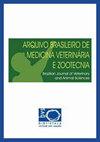基于二元logistic分析的颈圈监测奶牛健康障碍预测
IF 0.5
4区 农林科学
Q4 VETERINARY SCIENCES
Arquivo Brasileiro De Medicina Veterinaria E Zootecnia
Pub Date : 2023-06-01
DOI:10.1590/1678-4162-12880
引用次数: 0
摘要
摘要本研究的目的是利用R软件进行二元Logistic回归,分析农场项圈监测的身体活动和反刍时间数据,以及旋转挤奶系统记录的产奶量,以预测奶牛的几种疾病。收集1,618头健康奶牛的体炎(n=60)、乳腺炎(n=98)、跛行(n=35)和消化系统疾病(n=52)数据,用于构建预测模型。为了验证该方法的可行性和适应性,我们分析了未用于构建模型的同一畜群(畜群1)的奶牛数据,以及同一类型自动化系统记录的另一畜群(畜群2)的奶牛数据,结果表明,畜群1中分别有75.0%、64.2%、74.2%和76.9%的奶牛被正确预测患有胎炎、乳腺炎、跛行和消化系统疾病。在2头奶牛中,子宫炎、乳腺炎、跛行和消化系统疾病的预测正确率分别为66.6%、58.8%、80.7%和71.4%。与农场工作人员的传统临床诊断相比,开发的算法可以更早地预测奶牛的疾病。本文章由计算机程序翻译,如有差异,请以英文原文为准。
Prediction of health disorders in dairy cows monitored with collar based on Binary logistic analysis
ABSTRACT The objective of this study was to analyze data on physical activity and rumination time monitored via collars at the farm coupled with milk yield recorded by the rotary milking system to predict cows based on several disorders using the binary Logistic regression conducted with R software. Data for metritis (n=60), mastitis (n=98), lameness (n=35), and digestive disorders (n=52) were collected from 1,618 healthy cows used to construct the prediction model. To verify the feasibility and adaptability of the proposed method, we analyzed data of cows in the same herd (herd 1) not used to construct the model, and cows in another herd (herd 2) with data recorded by the same type of automated system, and led to detection of 75.0%, 64.2%, 74.2%, and 76.9% animals in herd 1 correctly predicted to suffer from metritis, mastitis, lameness, and digestive disorders, respectively. For cows in herd 2, 66.6%, 58.8%, 80.7%, and 71.4% were correctly predicted for metritis, mastitis, lameness, and digestive disorders, respectively. Compared with traditional clinical diagnoses by farm personnel, the algorithm developed allowed for earlier prediction of cows with a disorder.
求助全文
通过发布文献求助,成功后即可免费获取论文全文。
去求助
来源期刊
CiteScore
0.80
自引率
25.00%
发文量
111
审稿时长
9-18 weeks
期刊介绍:
Publica artigos originais de pesquisa sobre temas de medicina veterinária, zootecnia, tecnologia e inspeção de produtos de origem animal e áreas afins relacionadas com a produção animal. Atualmente a revista mantém 628 permutas (419 internacionais e 209 nacionais), sendo um verdadeiro suporte para o recebimento de periódicos pela Biblioteca da Escola.
A partir de 1999, a Escola de Veterinária delegou à FEP MVZ Editora o encargo do gerenciamento e edição de todas suas publicações, inclusive do Arquivo, ficando somente com o apoio logístico (instalações, equipamentos, pessoal etc.). O apoio financeiro é exercido pelo CNPq/FINEP e pela própria FEP MVZ.

 求助内容:
求助内容: 应助结果提醒方式:
应助结果提醒方式:


